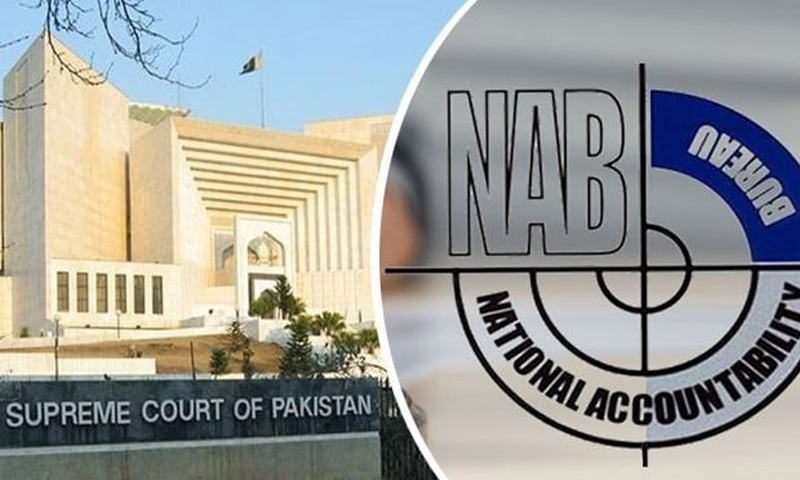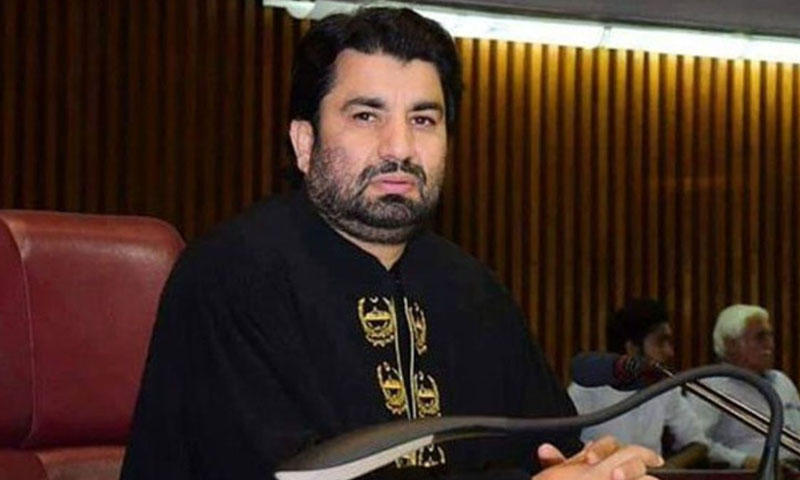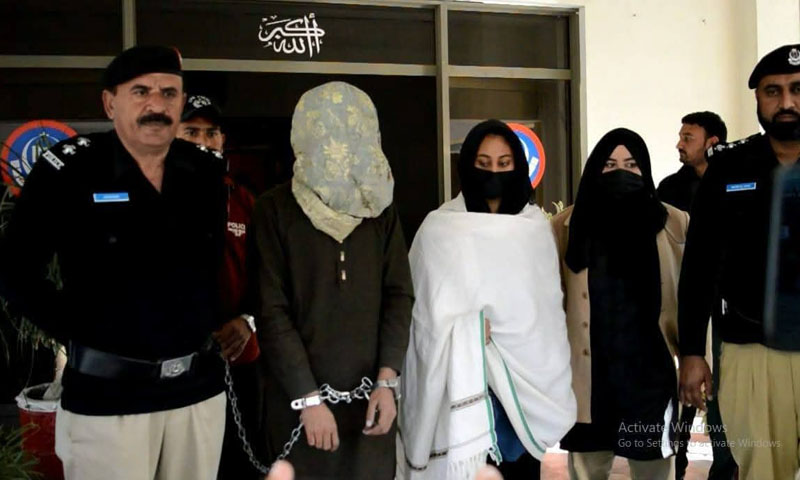- Web Desk
- 5 Hours ago
SC judges urge political dialogue, reserve verdict in NAB amendments case
-

- Web Desk
- Jun 06, 2024

ISLAMABAD: The Supreme Court has reserved its decision on the federal and provincial governments’ appeals against the nullification of the NAB amendments by former prime minister Imran Khan.
A five-member larger bench, headed by Chief Justice of Pakistan Qazi Faez Isa, including Justices Aminuddin, Jamal Mandokhail, Athar Minallah and Hasan Azhar Rizvi, heard the appeals.
During the hearing, lawyer Farooq H Naik highlighted various points from the court’s decision in his written submissions. He stated, “I have written my arguments on the Supreme Court’s decision.”
Chief Justice Isa asked Naik if he was supporting the decision, to which Naik responded that he supports Justice Mansoor Ali Shah’s note but has his own arguments.
Advocate Khawaja Haris, called by the Supreme Court for assistance, also appeared. Justice Athar Minallah questioned Haris about his client’s satisfaction with the 90-day remand and the NAB’s arrest methods. Haris replied, “Many amendments in NAB are good. His client was neither satisfied with the 90-day remand but nor with the arrests. The amendments that were good have not been challenged.”
Chief Justice Qazi Faez Isa asked, “When did the NAB Ordinance come into effect?” Lawyer Khawaja Haris responded, “The NAB law was introduced in 1999.” Justice Isa then asked, “Whose government was in power in 1999? Name them.” Khawaja Haris replied, “In 1999, it was the government of General Pervez Musharraf. Before Musharraf, there was a similar accountability act during Nawaz Sharif’s regime.”
The Chief Justice remarked, “Your client’s government would have restored the Accountability Act. Pervez Musharraf had stated that the purpose of NAB was to remove corrupt politicians from the system, a sentiment echoed by the PTI founder.”
Khawaja Haris clarified, “No politician’s name is mentioned in our petition.” The Chief Justice replied, “It seems the government of the PTI founder also sought accountability of politicians exclusively.”
Justice Athar Minallah advised, “Khawaja Haris, please present arguments on merit.” Chief Justice Isa asked, “How was a bench formed on NAB amendments based on practice and procedure? Provide the reason.”
Khawaja Haris mentioned, “In Justice Mansoor Ali Shah’s note, it was determined that the bench of practice and procedure became part of the decision.” The chief justice then questioned, “Why was no attempt made to press the pending application in the Islamabad High Court? You criticize us outside in front of the camera but not address your concerns here directly?”
Justice Jamal Mandokhail remarked that the Attorney General had been notified by the high court and questioned why the Attorney General did not try to reopen the case. The Attorney General responded that the summer vacation had already started.
Chief Justice of Pakistan Qazi Faez Isa commented, “When the Practice and Procedure Act was enacted, I had stopped sitting in court. At that time, there was a debate over whether the authority was mine or someone else’s. Babar went and became a big lion, but no one comes forward and talks to me about it.”
Justice Athar Minallah remarked, “There were powerful organizations like ISI and MI in the JIT of this case. Tell me, what happened to this case?”
Khawaja Haris replied, “Despite the presence of powerful institutions, nothing could be proven in this case.” Justice Athar Minallah then asked, “Khawaja Sahib, tell me which amendments were challenged. You challenged the amendments in Section 9 and Five A, and the deletion of Section 14.”
Justice Athar Minallah stated, “NAB’s purpose was for political engineering. Khawaja Haris, you are putting your client in trouble. If the NAB amendments are nullified, your client will suffer.”
Khawaja Haris responded, “Imran Khan is facing other cases, including NAB. Despite the difficulties, Imran Khan is still fighting the case of amendments. He knew that there would be difficulties for him if the amendments were revoked.”
Justice Athar Minallah remarked, “It will be difficult for Imran Khan to prove his assets according to his income. Isn’t it blackmailing to ask anyone to prove their assets according to their income?”
Justice Jamal Mandokhail said, “If someone asks me to provide receipts for my house, I would not be able to give them. It is impossible to account for legitimate assets.”
Justice Athar Minallah commented, “Now PTI should be told to prove their assets under the old law. You are creating difficulties for public representatives.”
Chief Justice Qazi Faez Isa questioned, “If Imran Khan had such a strict stance on accountability, why did he continue to give tax amnesty? Britain has been a democracy for years; why is tax amnesty not given there?” Khawaja Haris replied, “These are economic decisions, and I do not want to discuss them. The election commission has made separate declarations of assets; why don’t they ask for details of income tax?”
Justice Athar Minallah said, “You have to explain, based on the constitution, how the rights were affected by the amendments. The amendments withdrew draconian powers from NAB.”
The Chief Justice noted that Makhdoom Ali Khan, the lawyer for the federal government, had submitted a list. “It was mentioned in the list that in 2019, the then government had amended the NAB. Is it okay if you do?”
Imran Khan’s Arguments in the Supreme Court
After the break, PTI founder Imran Khan began his arguments in the Supreme Court.
Chief Justice Qazi Faez Isa asked Imran Khan, “Do you want to say anything related to the case?”
Imran Khan, via video link, replied, “I don’t understand one thing. You wrote that I scored political points in the last hearing. What political point scoring did I do?”
The Chief Justice suggested, “It would be great if you speak in Urdu.”
Imran Khan continued, “I was hurt. It was said that I am an irresponsible character, which is why it will not be broadcast live.”
The Chief Justice responded, “Judges do not explain their decision; you can file a revision.”
Imran Khan stated, “I oppose the government’s appeal in the NAB amendments case. Justice Athar Minallah said that if the amendments are made, I will suffer. I was imprisoned for 14 years because I undervalued the Tosha Khana gift. My watch worth Rs152 million was shown for Rs3 billion. I suggest that the NAB chairman should be appointed by the Supreme Court. If the government and the opposition do not agree, then a third umpire should be appointed. NAB should remain under the third umpire. Even during our time, NAB was not under our control.”
Justice Jamal Mandokhail asked, “Can Parliament amend or not?” Imran Khan replied, “Form 47 cannot be amended.” Justice Mandokhail noted, “You are going to the same side where the cases are pending.”
Justice Athar Minallah commented, “There was no reason for Imran Khan to cancel these amendments. Perhaps you did not read my note.”
Imran Khan responded, “After what NAB did to me in 5 days, what will be its credibility? The situation of the system 27 years ago led me into politics. Seven thousand billion dollars of poor countries are lying outside. There is a need for a special institution. I am in jail. Restoring the amendment will make it easier for me, but the country will become bankrupt. Names have also appeared in Dubai Leaks, money is going out of the country.”
Justice Jamal Mandokhail remarked, “Imran Khan’s words scare me too. The situation is so dangerous, so sit down and solve it with fellow politicians. When there is a fire, you don’t see whether it is pure or impure; you first put out the fire.”
Imran Khan compared, “In India, Arvind Kejriwal was freed and allowed to fight the elections by suspending his sentence. I was expelled from the elections by being punished within 5 days.”
Justice Jamal Mandokhail asked, “Who was to build the political system?” Justice Athar Minallah added, “Unfortunately, you are in jail. People have expectations from you.”
Imran Khan expressed, “If I speak from the heart, we are all looking at you. There is an undeclared martial law in Pakistan.”
Justice Jamal Mandokhail warned, “If anything happens, we will be suspicious of you. We are looking at you; you are looking at us.”
When Imran Khan referred to the cipher case, Chief Justice Qazi Faez Isa stopped him, stating, “An appeal may come before us in the cipher case.”
Justice Hasan Azhar asked, “Why did you sit in parliament and oppose the NAB bill?”
Imran Khan replied, “This is why the situation had become like this. The growth rate was at 6.2. The government was overthrown under a conspiracy. The parliament could not answer the same conspiratorial government.”
Chief Justice Qazi Faez Isa concluded, “Khan Sahib, you are talking about two different things. On one hand, you are talking about accountability, and on the other hand, you are giving amnesty.” Imran Khan explained, “We gave amnesty to bring the black economy into the mainstream after coming to the government.”
Chief Justice Qazi Faez Isa urged sitting in Parliament to solve problems and emphasized that the country needs to move forward. “We did not want to talk politics, but we are not stopping you. Dialogue can solve many things,” he said.
After the arguments, the Supreme Court reserved its decision on the government’s appeals regarding the NAB amendments.
What is the NAB amendment case?
During the PDM regime, amendments were approved in Parliament by the government coalition in sections 2, 4, 5, 6, 25, and 26 of the NAB Act, along with changes to sections 14, 15, 21, and 23. PTI Chairman Imran Khan filed a petition in the Supreme Court against these NAB amendments.
A three-member bench, headed by former Chief Justice of Pakistan Umar Atta Bandial, reserved the decision of the case on September 5, 2023. Justice Bandial had stated that he would decide this important case before his retirement. The bench also included Justice Ijaz-ul-Ahsan and Justice Mansoor Ali Shah.
On the last day of his tenure (September 15, 2023), former Chief Justice Umar Atta Bandial delivered the verdict by a majority of two to one. Justice Mansoor Ali Shah disagreed with the decision. The Supreme Court, in its verdict on Imran Khan’s petition, declared 9 out of 10 NAB amendments null and void.
The federal and provincial governments filed intra-court appeals against the decision. PTI founder Imran Khan requested to appear in person in the NAB amendment case, and the Supreme Court allowed his appearance via video link.
On May 10, 2024, the Supreme Court constituted a five-member larger bench to hear the intra-court appeals against the NAB amendment decision. The court reserved its decision today after various hearings.




